| Srl | Item |
| 1 |
ID:
148564
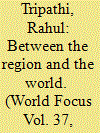

|
|
|
|
|
| Summary/Abstract |
India faces a very complex foreign policy dilemma concerning its regional and multilateral diplomacy today. On one hand it is logical that it should see strengthened regionalism as part of its global push for greater recognition and outreach. Therefore the importance of India’s regional engagements through vehicles such as SAARC, BIMSTEC and related sub regional projects can hardly be ignored. On the other hand its simultaneous thrust towards greater voice in International bodies such as the IMF and World Bank, WTO and even United Nations related agencies is part of a progression that has consistently been part of its foreign policy agenda for long. In between, it continues to pursue transregional initiatives such as BRICS, IORA and partnerships with EU as well as ASEAN.
|
|
|
|
|
|
|
|
|
|
|
|
|
|
|
|
| 2 |
ID:
081425
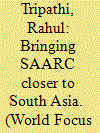

|
|
|
| 3 |
ID:
151210
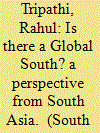

|
|
|
|
|
| Summary/Abstract |
Much of the writings on the Global South in recent years have focused on the role that some of the emerging economies within the developing world might play in the unfolding global scenario. It is asserted that the rise of a group of middle-level players, given their economic and political profile in global affairs, may be critical in shaping future global outcomes. Such an influence may come at a time when the power of the established powers is seen in relative decline, particularly given the volatility of the global political economy in recent years. The article tries to revisit this assumption from a South Asian perspective and tries to explore the fundamentals of the Global South in terms of its ability to provide alternatives. Taking South Asia as a test case, the article argues that the term ‘South’ itself as a homogeneous entity is problematic from the point of view of characterisation as well as actualisation of the potential alternatives. While this does not rule out coalition building and collective action between countries sharing common interests and objectives, such coalition building may be more diffused and episodic rather than have the potential to provide ‘alternative orders’.
|
|
|
|
|
|
|
|
|
|
|
|
|
|
|
|
| 4 |
ID:
110942
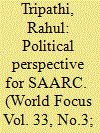

|
|
|
| 5 |
ID:
077202
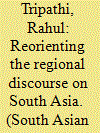

|
|
|
|
|
| Publication |
2006.
|
| Summary/Abstract |
The recent discourse on regionalism in South Asia has been marked more with the problems that hinder regional cooperation rather than the prospects that the grouping has in shaping the collective future of the region. Given the faltering steps the South Asian Association for Regional Cooperation (SAARC) has taken at regionalism in the last two decades, such pessimism is perhaps justified. As an institution, SAARC has remained an intergovernmental mechanism, which has had little relevance for the people of South Asia. The association has allowed the political logic to dominate over the economic, and therefore lags far behind several other regional and multilateral initiatives. The article revisits the existing regional discourse in South Asia and offers an alternative approach to the regional idea, the thrust for which comes from people below rather than the states at the top. According to this alternative paradigm, states must merely act as facilitators rather than initiators of regional initiatives and build upon evolving interactions in South Asia based on knowledge, technology, commerce and culture. This would require a reinterpretation of the operative mechanism of SAARC by modifying its original mandate and procedures. Secondly it would need greater accommodation and acceptance of each other's concerns by all South Asian countries and an approach that looks beyond the traditional notions of dominance and dependence.
|
|
|
|
|
|
|
|
|
|
|
|
|
|
|
|